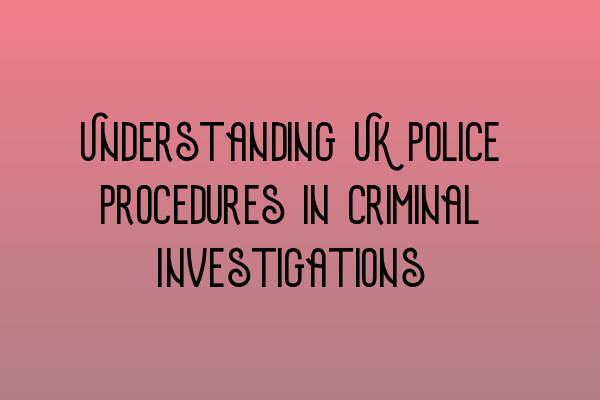Understanding UK Police Procedures in Criminal Investigations
When it comes to criminal investigations in the UK, understanding the police procedures is essential. Whether you are a law student preparing for the SQE exams or a legal professional looking to brush up on your knowledge, having a solid understanding of the procedures followed by the police can greatly benefit your criminal law practice.
One crucial aspect of criminal investigations is the gathering of evidence. The police are responsible for collecting evidence that can be used to support a case in court. This evidence can include forensic evidence, witness statements, CCTV footage, and more.
During the investigation process, the police have the power to arrest individuals suspected of committing a crime. This can happen either with a warrant or without, depending on the circumstances. The SQE 1 Practice Mocks FLK1 FLK2 can help you prepare for questions related to the arrest procedure in the SQE exams.
Interviewing Suspects
Once a suspect is in custody, the police have the right to interview them. This is an essential part of the investigation process as it allows the police to gather information and potentially obtain a confession. It is important to note that suspects have certain rights during the interview process. Understanding these rights can help you provide expert legal counsel to your clients. If you are preparing for the SQE exams, consider enrolling in SQE 2 Preparation Courses to enhance your knowledge on this topic.
During the interview, the police are required to follow specific procedures to ensure fairness and adherence to legal standards. This includes providing the suspect with access to legal representation, cautioning them, and documenting the interview properly. As a legal professional, being well-versed in these procedures can be highly advantageous in building a strong defense for your clients.
Evidence Handling and Chain of Custody
Proper handling of evidence is crucial for maintaining its integrity and admissibility in court. The police are responsible for preserving and storing the collected evidence securely. This process includes maintaining a chain of custody, which ensures that the evidence is not tampered with or compromised. Understanding the SQE 1 Preparation Courses can be immensely helpful in comprehending the intricate details of evidence handling and chain of custody requirements.
Additionally, as digital evidence plays an increasingly prominent role in criminal investigations, it is vital to have knowledge of the procedures for handling and analyzing electronic data. This includes understanding protocols for acquiring data from mobile devices, computers, and social media accounts.
Conclusion
Being well-informed about UK police procedures in criminal investigations is crucial for any aspiring or practicing criminal law professional. By understanding the evidence collection process, arrest procedures, suspect interviews, and evidence handling techniques, you can provide top-notch legal advice and representation to your clients.
If you are preparing for the SQE exams, make sure to check out the SRA SQE Exam Dates to stay updated on the latest exam schedules. Additionally, consider accessing the SQE 1 Practice Exam Questions to enhance your understanding and test your knowledge before the actual exam.
